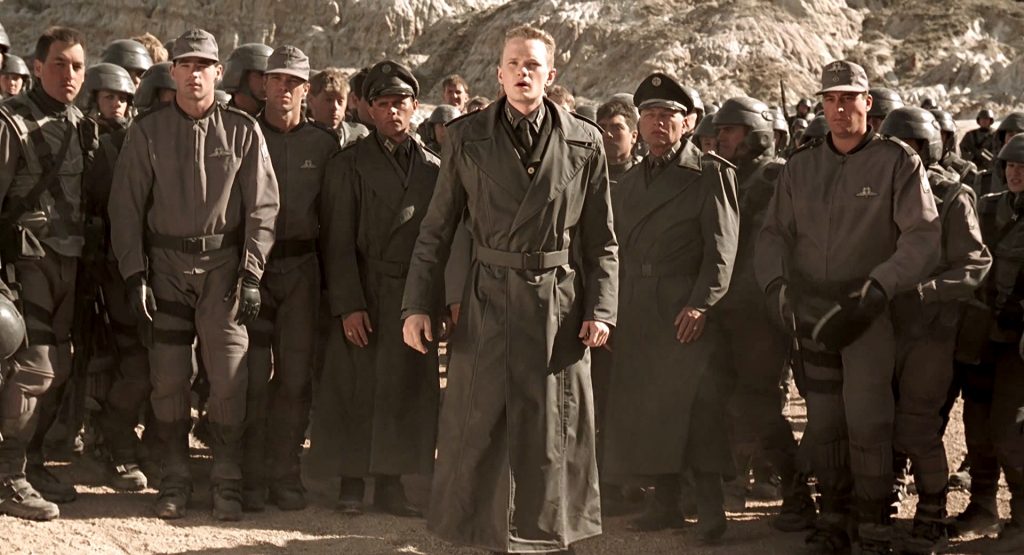
I’m a long-time fan of offensive cinema. Anything which creates outrage in a section of viewers is all but guaranteed to pique my interest, even if, in most cases, the reaction is far in excess of what is merited. These days, mere sex and violence is rarely enough. The level of cinematic bloodshed which would have merited a full-on Daily Mail campaign and resulting government legislation by David Alton back in the eighties, can now be found on your basic cable package in the shape of a zombie apocalypse. If there’s a contentious area around the Thanksgiving dinner table, it’s more likely to be politics, a topic which many sensible married couples tacitly agree to avoid, for the sake of household harmony.
Both cinema and Hollywood have, traditionally, been seen as s liberal bastion, and its products largely reflects this surface ideology. Though as recent revelations regarding Weinstein, Spacey, etc. show, it appears tenets of sexual equality, etc. may be touted more for show than actually adhered to. The one genre to which this generally does not apply is action films. These have, since the days of John Wayne if not before, been a resolute bastion of the right. Arnold Schwarzenegger, Clint Eastwood, Bruce Willis, Stephen Seagal: hardly any bleeding-hearts to be found there. Probably because they ain’t got time to bleed…
This should not be surprising, if you think about it. If certainly not inevitable, action films tend to possess a number of qualities generally in line with conservative thinking, such as patriotism, personal responsibility, a strong belief in the law (or, at least, justice), and of course, the right to bear arms. Its heroes are frequently authority figures – policemen, soldiers – or others who embody strength, in a way some on the modern left deride as “toxic masculinity.” For them, while emotions are sometimes an instigator, the genre requires these to be put to one side when the time comes, the hero rolling up his sleeves and doing what needs to be done.
Sometimes, however, a film is seen as being even further to the right, and labeled as fascist. Twenty years ago this month, Paul Verhoeven’s Starship Troopers hit cinemas, and has been misunderstood by some, ever since. No-one who knows the slightest about Verhoeven would call him a fascist – he grew up in occupied Holland during World War II, so has first-hand experience of what life under the Nazis is like. Although the film foregrounds aspects which were present in Robert Heinlein’s original novel, but generally does so with the intent of satirizing these, such as its glorification of war.

However, there are two aspects which do lend themselves to fascistic interpretation. Firstly, it’s staggeringly well-made propaganda. As another author wrote, “Starship Troopers is so misunderstood because it’s too good at doing the things it’s satirizing.” If you don’t reach the end, and “want to know more” about killing bugs, you may be dead. It’s a thoroughly effective piece of rabble-rousing, that slides by only because the enemy is entirely non-human. Mentally replace “bug” with, say, “Taliban”, and the tone shifts entirely, especially in a post-9/11 universe. For just as with Robocop, also a collaboration between Verhoeven and writer Ed Neumeier, Troopers has proved remarkably prescient in predicting the trajectory of future society in some ways.
The other is that the society portrayed is extremely high-functioning. From what we see (which may not be the whole picture, especially in a propaganda piece like this), there’s no poverty or need. The fascists won, yet everyone seems happy, with no indication of liberty being restricted. It’s almost as if Verhoeven is suggesting the right to vote isn’t all it’s cracked up to be. Even unintentionally, that is strikingly subversive, and near unheard of in any Hollywood film. The dirty little secret is: he isn’t necessarily wrong. As a green card holder, not a citizen, I haven’t been able to vote since coming to America in 2000. This complete disenfranchisement has made absolutely no practical difference to my life. Voting: it’s vastly over-rated.
From my perspective, I can’t say I mind “Service guarantees citizenship” either – an aspect of the Heinlein novel which made it into the movie, almost intact. If you’re going to decide how society is run, you should be willing to contribute to it. With the current universal franchise is, people vote based largely on their self-interest, e.g. “Will I get a tax cut?” and are easily manipulated, problems about which even founding fathers like John Adams were very much concerned. If you instead limit the franchise to those willing to risk their lives for the sake of the country, you are likely increasing the odds they will vote based on the common good, rather than their own selfish ends.
Um, I seem to have drifted off the film topic into political polemic. Sorry. Please pass the mashed potatoes…

Anyway, a decade after Troopers was cleared for take-off over the heads of many viewers, a new contender to be tarred with the “Fascist!” label arrived. And this one wasn’t able to play the “Satire” card. As soon as it was released, Zach Snyder’s 300 was being described as “fascist filth,” and it has become a common theme of left-leaning reviewers. Frank Miller, who created the graphic novel on which the film is based – often at a shot-for-panel level – hasn’t exactly endeared himself to that side of the political spectrum since. For example, there was his piece in 2011 where Miller described the “Occupy” movement (remember them?) as “a pack of louts, thieves, and rapists, an unruly mob, fed by Woodstock-era nostalgia and putrid false righteousness.”
It doesn’t help matters that the word “fascist” has never had a clear meaning. Fascism in Italy, where it started, was a radically different beast from that which developed in Germany. Academics still struggle to come up with any kind of definition broad enough to encompass the necessary regimes, while not being applicable to, say, left-wing dictatorships. Matters have not been helped by recent events, with the term being diluted by vigorous and over-broad misuse, including America’s current president and those who voted for him. However, there are certainly elements of 300 which demonstrate the overlap between action cinema and fascist thinking.
Most obviously, is the adoption of violence as a tool for problem-solving – albeit certainly nothing unique about 300 there. Virtually the point of the action genre is to see the good guy taking on, and defeating the bad guys. Be it Westerns, war movies, kung-fu flicks or whatever, violence defines the genre, though for the heroes, it’s almost always as a reaction. In 300, it’s not just a solution for the Spartans, it’s the solution. Ambassador doesn’t like something you say? Kick him into a pit! Child born less than perfect? Toss him over there with the others! [We’re not as far removed from the latter as you might like to think. In 1937, an American poll found 2/3 of respondents supported the sterilization of “mental defectives”, and 63% the sterilization of criminals]
300 also has a strictly hierarchical structure, dominated by a strong authority figure at the top. Again, this is not abnormal: action films almost always have a well-defined pyramid of hero/villain, sidekick and minion, with opportunities for promotion being kinda light. What the hero does is right, even if they are wrong. When Leonidas doesn’t get his way, and the war he wants, he simply bypasses the checks and balances and does the Spartan equivalent of issuing an executive order, marching off to eventual heroic death. His wife, Queen Gorgo, is apparently unbothered, saying, “Come back with your shield, or on it.” Whatever. S’up to you.

There’s a strongly nationalist tone present as well. Leonidas and the Spartans don’t just hate the invading Persians, they have little love for the other Greek city-states, deriding the Athenians as “philosophers and boy-lovers”. The homophobia is likely a little questionable as far as historical accuracy goes [since I’m at work, I’m going to pass on having searches for “Spartan homosexuality” in my browser history!] and is certainly an odd counterpoint to an army which basically charges off to war in battle Speedos. Indeed, this cult surrounding physical strength is something common in fascism, as seen in movies like Leni Riefenstahl’s Olympia. Meanwhile, the Persians are portrayed from the top down as the ultimate degenerates, a sharp contrast to the Spartans.
But it is worth noting the context in which the story is being recounted. As becomes clear at the end, it’s not a historical document, even in the context of the movie. It’s a post-facto polishing, a heroic tale told to rile up the full Spartan army in advance of a greater battle against the Persians. Seen in this light, it is every bit as self-aware of its status as propaganda as Starship Troopers, though the intent is definitely not as satirical. This is intended to rile up the listener. Complaining about its relentless depiction of the enemy as bad people, is as sensible as whining because Lord of the Rings didn’t give equal time to the orcs’ point of view.
Like Verhoeven’s movie, it was followed by a sequel which didn’t quite “get it.” 300: Rise of an Empire (or 301 as it’s known in our house) made those philosophizing boy-lovers from Athens the heroes, and explicitly stated that the purpose of this fight was to defend democracy – something not exactly high on the list of Spartan priorities in the original. Despite failing to trigger Guardian columnists in the same way, it did have the glory which was Eva Green as Artemisia. She is easily the best character in either film – and I have to say, I likely prefer it as entertainment, mostly due to her unhinged lunacy.
In the end, do the films’ political viewpoints matter? Despite having just spent over 1,500 words discussing them, I wouldn’t say so. Providing they are entertaining, which I’d certainly say is true of both Starship Troopers and 300, I’m perfectly capable of enjoying movies, regardless of whether or not I agree with their political agenda. Indeed, I’m probably more likely to be impressed if you can take an opposing viewpoint – in any area, not just politics – and make me appreciate its merits. If you can rub people the wrong way while doing it, so much the better.
